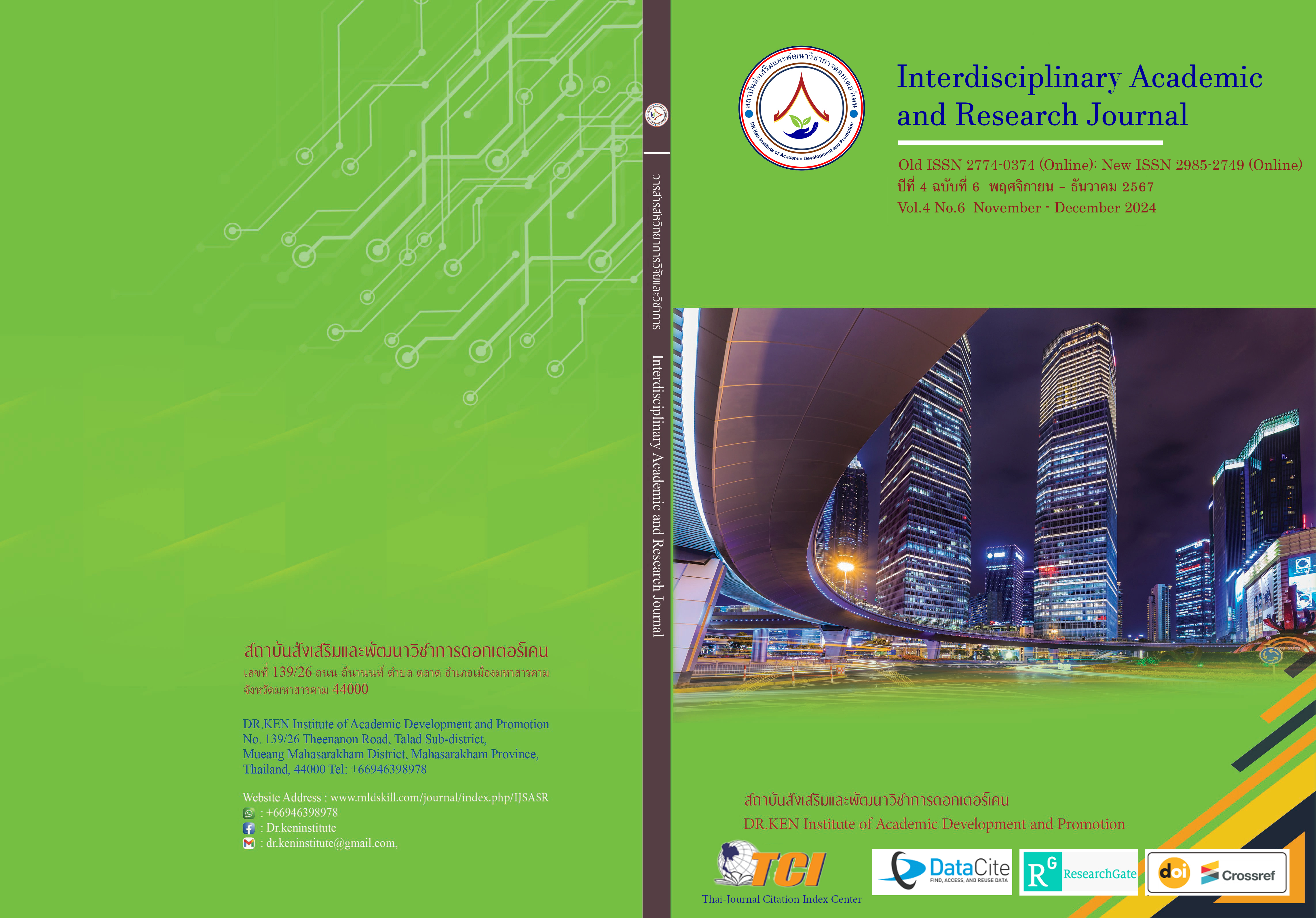A Strategic Training Model for Building Cultural Literacy of Broadcasting
DOI:
https://doi.org/10.60027/iarj.2024.278236Keywords:
Cultural Literacy, Media Literacy, Broadcasting Education, Professional Development, Cross-cultural Communication, Training ModelAbstract
Background and Aims: Cultural literacy in broadcasting is essential for representing varied audiences, promoting inclusivity, and avoiding prejudices. Develop a cultural literacy training strategy to equip broadcasters to engage with different cultures, improving audience communication and trust. The research objectives of the Strategic Training Model for Building Cultural Literacy in Broadcasting are as follows: 1) To investigate the knowledge and practical needs of broadcasting hosts to improve cultural literacy. 2) To develop and implement a strategic training model for building cultural literacy and broadcasting talent.
Methodology: Questionnaires, structured interviews, and assessment forms were used. We examined data using percentages, averages, the pre-test, and post-tests.
Results: The research indicates the low cultural literacy of broadcasting talents in Guangxi universities. It also shows that most universities, including Guangxi University for Nationalities, College of Arts, and University of Foreign Languages, are still behind in their plans to improve it. it is urgent and necessary for both students and teachers to enhance the cultural quality of broadcasting talents. The results suggest that this methodology improves broadcasting talent culture and professional education. A systematic endeavor to increase strategic training for broadcasting students' cultural literacy demands instructors' persistence and inventiveness. Through differentiated guidance, diversified practice, school-enterprise cooperation, and systematic implementation, we can comprehensively and deeply improve broadcasting students' cultural literacy, developing more excellent broadcasting and hosting talents for society.
Conclusion: The study emphasizes how crucial it is to improve cultural literacy among Guangxi universities' broadcasting talent, as they are currently falling behind in this regard. The development of more skilled broadcasting professionals can be achieved through the implementation of strategic training, differentiated guidance, diversified practice, school-enterprise cooperation, and systematic efforts to improve cultural literacy and professional education.
References
Abd, S., Sugirin, S., & Margana, M. (2023). Interconnection of Cultural Literacy in Learning English and its Understanding as a Foreign Language in Higher Education. International journal of English language and linguistics research, doi: 10.37745/ijellr.13/vol11n218
Banks, J.A., & Banks, C.A.M. (Eds.). (2019). Multicultural education: Issues and perspectives. John Wiley & Sons.
Chen, S.Y. (2016). Research on the transformation and upgrading of Chinese program hosts under the "all-media era". (Doctoral dissertation) Tianjin Normal University.
Chen,L, & Lu, J. (2018). Investigation and analysis of excellent traditional cultural accomplishments of college students majoring in broadcasting and hosting. Modern Communication(Journal of Communication University of China). 40(4),165-167.
Cigdem, B., Annamaria, N., Koen, L. (2022). Editorial: Inclusive Media Literacy Education for Diverse Societies. Media and Communication, doi: 10.17645/mac.v10i4.6625.
Fullan, Michael. (2020). The nature of leadership is changing. European Journal of Education. 55 (2), 139-142. 10.1111/ejed.12388.
Kolb, D.A. (2014). Experiential learning: Experience as the source of learning and development. FT Press.
Li, Y., & Zhang, X. (2021). Cultural literacy and media practices: A study of broadcasting in Guangxi. Journal of Media and Cultural Studies, 19(3), 245-260.
Liang, F. (2016). The deficiency and countermeasures of classical Chinese education for broadcasting and hosting majors. Journal of Journalism Research, 7(8), 1-10.
Luo, X. (2011). An analysis on the training mode of media talents in the new Media era -- taking broadcasting and hosting major as an example. Social Scientist, 9, 1-10.
Mccarthy, V., & Plummer, J. (2016). Management information systems and the protection of private information: An ethical framework for decision makers in organizations. Journal of Information Systems Technology & Planning, 8(19), 128-136.
Sangita, K., Gupta., D., Sharma., R., & Arti, T. (2023). Exploring Factors Affecting Media Information Literacy. Journal of Library & Information Technology, doi: 10.14429/djlit.43.02.18608
Smith, A., & Johnson, B. (2022). The Impact of AI in Government Strategic Planning: Real-time Data Analysis. Government Analytics Journal, 15(2), 45-58.
Sun, M.L. (2022). Research on the value and strategy of broadcast hosts in mass cultural communication. Life and Partner, 23, 17-19.
Wang, F.J. (2019). Cultural and aesthetic qualities of broadcasting and hosting under the background of media convergence. TV Guide, 18, 1-10.
Wei, L. (2019). Exploring how to cultivate cultural students majoring in broadcasting and hosting arts. Education Modernization, 6(60), 188-189.
Wu, W. (2021). Analysis on the role of Chinese Classical Culture in broadcasting and hosting. Media Forum, 4(2), 1-10.
Xu, A.H. (2021). Research and practice on training system of etiquette and cultural Characteristics talents for broadcasting and hosting arts majors. Chinese Journal of Radio and Television, 12, 1-14.
Zhang, X. (2023).The cultivation of traditional cultural accomplishment by TV program broadcasting. Encyclopedic Knowledge, 9, 25-26.
Zhang, Y. (2019). Research on the Effective Training of "Classic Reading" and broadcasting and Hosting artistic talents. Media Forum, 3(6), 68-70.
Zheng, Y.X., & Cheng, B.J. (2021). Responsibility and Mission: Deepening of cultural self-confidence in college Broadcasting and Hosting Arts Education. Western Radio and Television, 42(16), 1-10.
Zhou, J., & Li, L. (2020). Integrating online and offline learning: A study on the application of Guangxi in educational strategies. Journal of Educational Technology Development and Exchange, 13(2), 112-125.
Downloads
Published
How to Cite
Issue
Section
License
Copyright (c) 2024 Interdisciplinary Academic and Research Journal

This work is licensed under a Creative Commons Attribution-NonCommercial-NoDerivatives 4.0 International License.
Copyright on any article in the Interdisciplinary Academic and Research Journal is retained by the author(s) under the under the Creative Commons Attribution-NonCommercial-NoDerivatives 4.0 International License. Permission to use text, content, images, etc. of publication. Any user to read, download, copy, distribute, print, search, or link to the full texts of articles, crawl them for indexing, pass them as data to software, or use them for any other lawful purpose. But do not use it for commercial use or with the intent to benefit any business.
















.png)


